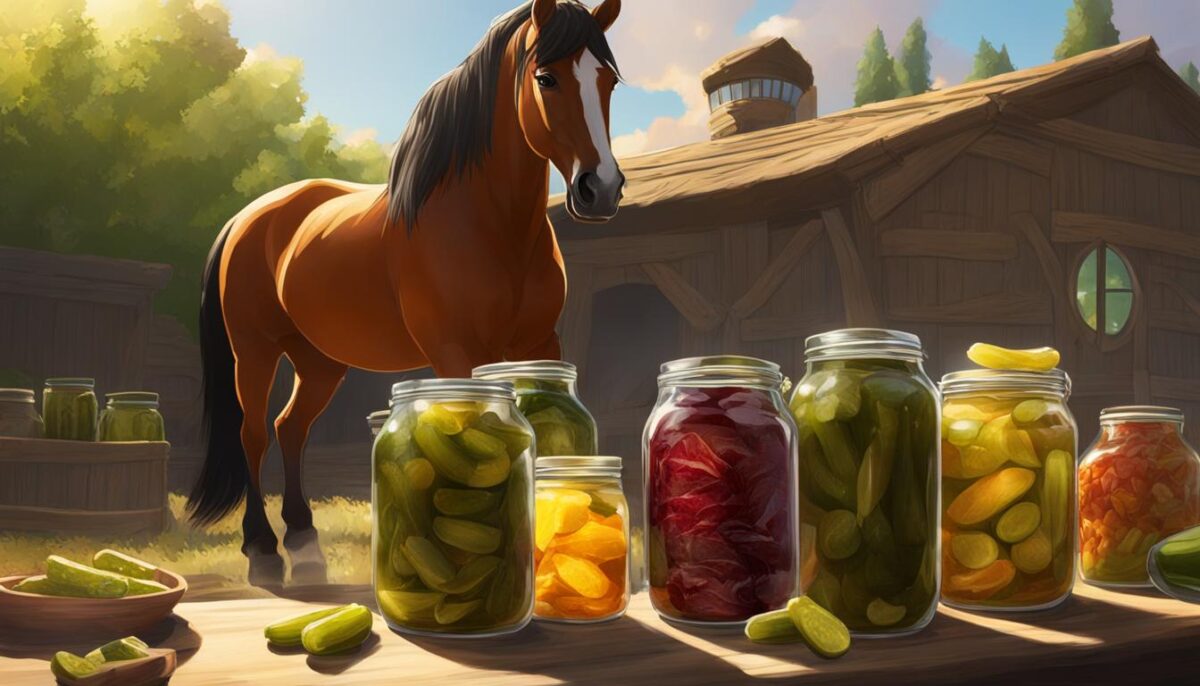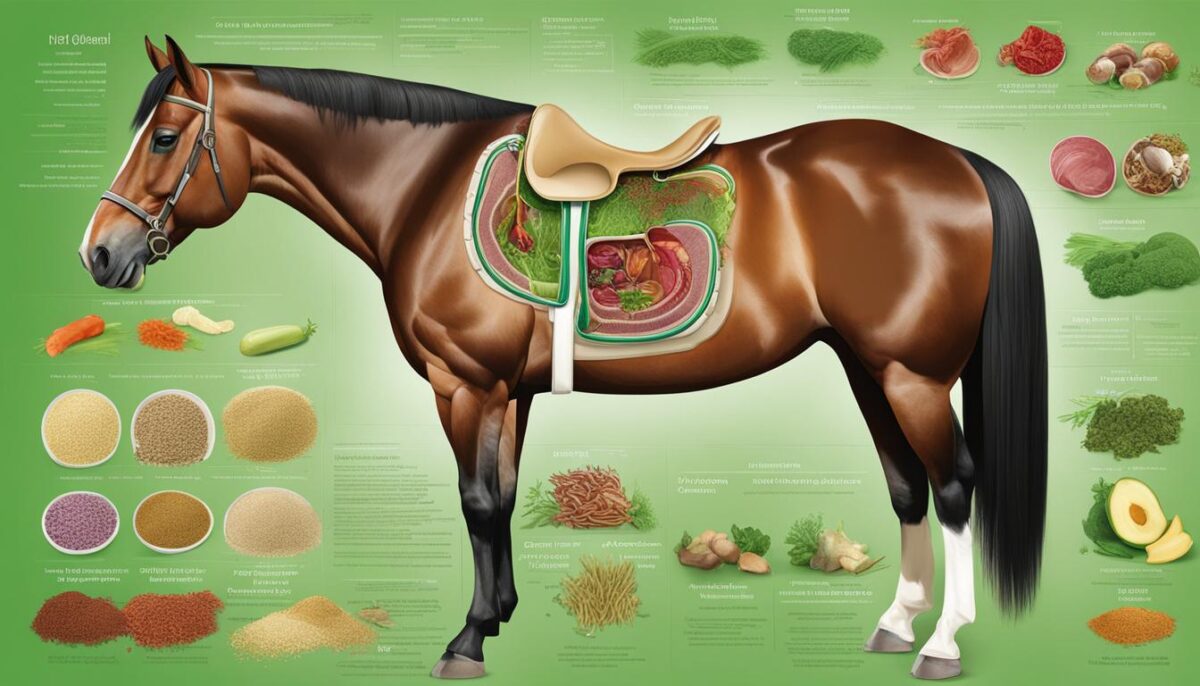When it comes to equine nutrition, it’s important to carefully consider your horse’s diet. As you explore different foods, you might be wondering if pickles are a safe snack for horses. In this article, we will discuss the impact of pickles on horse nutrition, the role of fermentation, and alternative treats for your equine friend.
Key Takeaways:
- Understanding the basics of pickles and their impact on a horse’s diet.
- The role of fermentation in equine diets and its potential benefits.
- Considering the risks associated with the sodium content and other pickle ingredients.
- Exploring the importance of gut health in horses and their nutritional needs.
- Discovering safe and healthy treat alternatives to pickles for your horse.
What Are Pickles? Understanding the Basics
Pickles are cucumbers that have gone through a process of preservation known as the pickling process. This process involves submerging cucumbers in a liquid called brine solution, which is primarily made up of water and salt. The cucumbers are then left to ferment.
The fermentation phase allows beneficial bacteria to develop, leading to the formation of probiotics. These probiotics have several health benefits for humans, making pickles a popular choice for gut health and overall well-being. However, this may not be the case for animals like horses that require carefully managed diets.
As horse treats, pickles might pose some problems due to their high sodium content. The brine solution used in the pickling process is rich in salt, and this could make pickles less than ideal for equine consumption. In the following sections, we will delve deeper into the risks associated with feeding pickles to horses and explore healthier treat options for your equine companion.
Can Horses Eat Pickles?
Feeding horses might seem straightforward, but it’s essential to understand the implications of introducing specific foods into their diet. As pickles offer probiotic benefits that could impact a horse’s gut health, it’s vital to weigh the advantages against potential concerns related to their sodium content and other ingredients.
The Role of Fermentation in Equine Diets
The role of fermentation in equine diets is gaining interest as it can provide health benefits to horses similar to those seen in humans. Fermented feed products can contain beneficial bacteria that support a horse’s gut health, leading to better nutrient absorption and a stronger immune system. It’s important for horse owners to look for feeds that contain high-quality fermentation metabolites to ensure their horses receive the fullest possible benefits from these products.
Pickles and Sodium Content: Is It Too Much for Horses?
While fermented foods like pickles offer probiotics that could benefit a horse’s gut health, the high sodium content in pickles poses a concern for equine nutrition. Horses are not accustomed to consuming such high levels of salt, and excessive sodium intake could negatively affect their health, potentially causing issues such as high blood pressure. Adjusting a horse’s diet should be approached with caution, as introducing excessive salt could do more harm than good.
Evaluating the Risks Associated with Pickle Ingredients for Horses
Beyond salt, pickles can contain sugar and other additives that may not be suitable for a horse’s diet. Just as in dogs where pickles can pose a threat due to the high sodium and sugar content, similar concerns apply to horses. Horse owners need to consider the overall impact of these ingredients on their equine companions’ health and well-being to make informed decisions about what they feed their horses.
| Probiotic Benefits | Sodium Content | Other Ingredients |
|---|---|---|
| Supports gut health and immune system | High levels of salt, potentially harmful for horses | Sugar and additives, not suitable for horses |
The Impact of Gut Health on Horse Nutrition
For a horse to truly thrive, maintaining excellent digestive tract health is crucial. A horse’s equine digestive system plays a critical role in their ability to absorb nutrients efficiently and maintain a strong immune system. By focusing on promoting a balanced gut environment, you can greatly improve your horse’s overall health and well-being. Let’s explore the importance of gut health and how it affects nutrient absorption in horses.
Fermentation metabolites, produced by feeds specifically formulated for horses, can offer immense benefits for the millions of bacteria that live in the horse’s gut. These metabolites help create a stable environment for gut bacteria, leading to improved gut health and more efficient absorption of essential nutrients. With a well-balanced gut, your horse will have better overall health and be more prepared to face various challenges.
- Supports a stable gut environment
- Improves nutrient absorption
- Boosts the immune system
- Enhances overall health in horses
In conclusion, focusing on gut health should be a priority when it comes to equine nutrition. The right balance of bacteria in the equine digestive system goes a long way in ensuring the efficient nutrient absorption in horses, thus guaranteeing their health and resilience against illnesses. By choosing feeds specifically formulated for horses and monitoring their gut health, you can help your equine companion achieve their full potential.
Appropriate Treats: Alternatives to Pickles for Horses
While pickles might not be the best choice for horses, there are plenty of healthy horse treats available that are both safe and enjoyable for your equine friends. Your horse will appreciate snacks that are low in sodium and support their overall well-being. In this section, we explore some tasty and safe equine snacks that make perfect substitutes for pickles.
One popular option for horse treats is fresh fruit, specifically apples. These sweet, crunchy treats not only offer great taste, but also provide essential nutrients without the excessive salt content found in pickles. Carrots are another nutritious and low-sodium treat option for horses. With their satisfying crunch and natural sweetness, apples and carrots are favorites amongst many equines.
When looking for the perfect snack, it’s crucial to choose low-sodium treats for horses that complement their main diet while supporting their delicate digestive health. Remember that moderation is key – even with healthy treats – to maintain a well-balanced diet for your horse. By offering your horse nutritious and tasty alternatives to pickles, you’ll keep them happy, healthy, and ready to thrive.
FAQ
Can horses eat pickles as part of their diet?
Although pickles contain probiotics that could benefit a horse’s gut health, their high sodium content makes them unsuitable for horses. Excessive sodium intake can negatively affect a horse’s health, so it’s best to look for other treat options.
How do fermented foods affect equine nutrition?
Fermentation in equine diets is gaining interest due to potential health benefits similar to those seen in humans. Fermented feed products can contain beneficial bacteria that support a horse’s gut health, leading to better nutrient absorption and a stronger immune system. However, not all fermented foods are suitable for horses, so it’s crucial to select the right products specifically formulated for equine consumption.
What are the potential risks associated with feeding pickles to horses?
Feeding pickles to horses can pose risks due to their high sodium content and the presence of additives like sugar. Excessive sodium intake could lead to health issues such as high blood pressure, while sugar and other additives may disrupt a horse’s overall dietary balance and well-being.
How does gut health impact horse nutrition?
Gut health plays a critical role in a horse’s ability to absorb nutrients efficiently and maintain a strong immune system. A well-functioning digestive tract, supported by beneficial gut bacteria, ensures a stable gut environment and optimal nutrient absorption, ultimately benefiting the horse’s overall health.
What are appropriate treat alternatives to pickles for horses?
Safe and healthy treat alternatives for horses include low-sodium options such as apples and carrots. These snacks offer nutritional benefits without the excessive salt content found in pickles and are less likely to disrupt a horse’s delicate digestive health.


